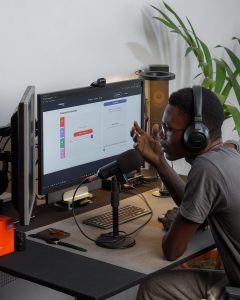The barrier to entry for podcasting is notoriously low. Literally, ANYONE can launch a podcast. All they need is access to the internet and the ability to record audio. With free hosting services like Anchor, you don’t even need money to launch your show. This unprecedented accessibility is a great thing, but it can be a double-edged sword. When everyone can do something, how can we stand out amongst the noise?
I’d argue that while starting a podcast is something anyone can do, being a good podcaster is something that cannot be done without much time, effort, and talent. One of the most difficult yet fruitful skills a podcaster must develop is the skill of interviewing.
In this brief article, I want to share three simple ways that you can improve this essential skill.
Research Thoroughly
With 598 episodes and 11 million downloads of The Jordan Harbinger Show under his belt, Jordan Harbinger is no stranger to podcast interviews.
His advice? “You need to out prepare everyone else.”
He shared that during a must-watch conversation with none other than Sean Cannell. You can check that out here:
Out preparing other interviews literally looks like doing your research.
Harbinger says, “Read the freaking book. I know that sounds really simple, but people are lazy. They won’t do that, but here’s the upside – you don’t have to have a Ph.D. on whatever they’re teaching, you just have to know it well enough to have an intelligent conversation with them. That will make you already better than 95% of other content creators out there.”
He continued to give a few really practical tips.
- Read their book and get to know their work (Sadly, most hosts won’t.)
- Go to their Wikipedia (not the article, the talk page – Jordan explains this at the 06:47 mark.)
- Look up the people your guest thanked in their book. Google them together to see if there is a nostalgia-inducing moment you can mention.
Listen
Remember – your show belongs to you. The episode belongs to your guest.
The best interviewers say shockingly little. Larry King (who might just be the actual “king” of interviewing) once said, “a lot of talk show hosts, the guest is a prop for them – the guest is there to serve their needs. I never felt that way.”
Your audience will build a relationship with you over time, but you don’t need to force it.
Ask good questions and keep the conversation from getting stuck. You don’t have to monologue.
To get back to Larry King, he made a point to “never ask a question over two sentences long.”
Respond Thoughtfully
If you listen well, you’ll be able to respond well. Too many podcasters drag their guest from question to pre-prepared questions instead of taking the time to truly hear them and allowing the conversation to flow naturally.
Consider keeping a small notepad next to you and jotting down a quick note when they are saying something in an answer you want to return to.
Responding thoughtfully can also look like simply giving a better response than “yeah, definitely… definitely…” or “one hundred percent, so anyway” every time they give you an answer. Instead, enhance your responses.
Chris Voss might be a former FBI hostage negotiator, but his advice – properly applied – can serve as a secret weapon for podcasters. I want to share two that I use regularly.
- Mirroring
Mirroring is the repetition of key words the other person uses in conversation. It’s designed to show the person that you’re listening and that you understand them.
You can do this by repeating the last three words that someone says. This can be used in place of “What do you mean by that” or “please go on.”
A mirror will always cause someone to restate themselves in another way. - Labeling
Labels are verbal observations of feelings. Labeling avoids the word, “I” and keeps the focus on your subject. “I” is a pattern interrupt that puts the spotlight on you and interrupts their train of thought. Labels cause stream-of-conscious reactions.
Examples:
It seems like…
It sounds like…
It looks like…
You seem…
You sound…
You look…
You’ll get far better responses to these every single time.
By researching, listening, and responding thoughtfully, you can take your podcast converations to the next level. Try implementing just one of these tips as you prepare for your next interview. Comment below with your TOP interview tip.


